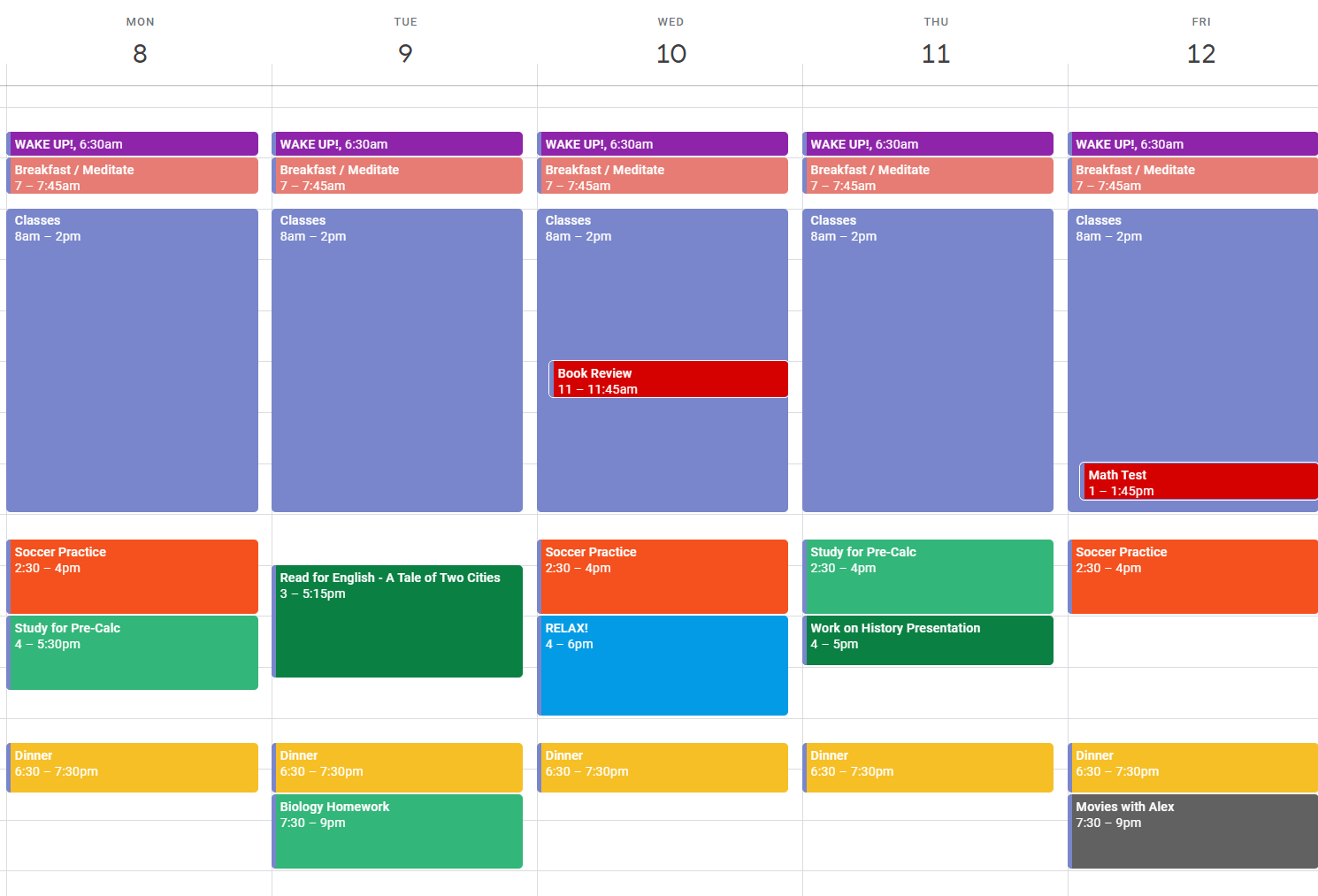Have the adults in your life been hassling you about making the most of high school in preparation for college? Maybe you’ve been nudged towards classes that will look good on your transcript or lovingly pushed in the direction of extracurriculars that lend themselves to impressive application essays?
If that sounds familiar, I want you to know: that’s not what this article is about.
There are so many things to do in high school but, in some cases, the preoccupation with using high school as a tool to get into college can make life miserable and activities unenjoyable.
But there is hope high school is about more than preparing for college. If you want to make good use of your high school years and prepare for college and have a good time, the tips below are for you.
Six Ways to Make the Most of High School and Still Have Fun
1. Practice good time management in high school, since it’s likely to get harder in college.
One of the reasons college is more stressful than high school? You’re more independent. And because you’re more independent, life in general requires better time management. You’ll have way more obligations and your professors are not going to chase you down to remind you about that deadline next week. Not only that but your parents won’t be just a few feet away and able to bug you when you slack off.
Using a calendar to track your day is an easy way to start managing your time a bit better. Some people prefer an old-school, pen-and-paper planner. Studies show that writing things down with your hand (rather than typing them onto a screen), makes you more likely to remember them.
But your paper planner can’t send reminders to your phone. If you prefer tech, you can’t go wrong with good ol’ Google calendar. (It’s what I use.) iCalendar is also great, or your parents might have a Cozi Calendar membership you can take advantage of.
Here’s what your calendar might look like:
Regardless of the type of calendar you use, here are a few basics of good time management:
Put tests, practices, events, meetings, appointments, project due dates, and days off into your calendar as soon as you find out about them--this could be as early as the first week of the semester when you get your syllabus.
Once you know when something is due, decide how long it will take to do it. Work backwards and schedule time into your calendar to work on that project or study.
For example, if your science project is due on May 10th, you could allot one hour each day to work on it, May 1 - 9. Or maybe two hours every two days.Make sure there’s space in your schedule for downtime and fun, too! If need be, block out time to see your friends or just binge that new Netflix show. That way, when someone asks you to help them study on Sunday afternoon, you can tell them you’re busy. Busy watching the new season of Game of Thrones, that is.
2. Balance your studies with life
You know that colleges favor well-rounded applicants--people who volunteer and get good grades, test well and take part in their communities. But balancing your studies and life is about more than just creating a competitive college application.
Taking time away from your studies will invigorate you and activate different parts of your brain. Making art, playing soccer, or just going to a concert will recharge your mental batteries in a way that a 10-minute study break can’t. Participating in life outside of academics also boosts your creativity, increases your emotional intelligence, and helps you strengthen relationships.
And just as importantly--it’s fun.
Make time to get out of your books and into your life.
3. Get involved with on-campus (AND off-campus!) organizations.
High school is about more than GPAs and SATs; it’s often a place where you form lifelong friendships. And sometimes it’s easier to form those friendships when you see people outside of chemistry class.
Explore a few of your school’s organizations--try the debate club, Ultimate Frisbee, fencing, or student government. If your school doesn’t have any organizations that light your fire, try starting your own. Maybe lots of people would want to play Quidditch if you started a team?
If starting a school organization isn’t your style, explore the groups and organizations your community has to offer. Check out rec league sports, volunteer at the local animal shelter, or sing with your church’s choir.
Here are a few other ways to connect with people in your community:
Meetup.com: A website that allows users to create events and meetup groups in their local community around any topic you can imagine: Pick-up basketball games, book clubs, weekend, painting groups, mobile app developer meetup groups for girls. Have an interest? There’s probably a meetup for it. Don’t see it? Start your own!
Your local community center: You know that building in the park with all the flyers promoting rec league sports, town hall meetings, and litter pick ups? Poke your head in and see if there’s anything on the calendar that appeals to you. It’s a great way to get to know your neighbors.
Check out greatnonprofits.org to find a non-profit near you
Use the search feature at Idealist.org for even more.
Ask your counselor! There could be something coming up next week that you don’t even know about.
Connect with a local museum--many have teen programs and docent opportunities--or check with your local animal shelter, YMCA, temple, church, or synagogue.
Maybe even go back to your middle or elementary school and see how you can help.
4. Get to know your teachers
Fun fact: your teachers are real, actual humans who have senses of humor, hobbies, and interests outside of getting you to turn in your homework on time. Shocking, right?
One of the easiest ways to make the most of high school is to talk to your teachers and get to know them.
Stay after class and ask that question that seemed too in-depth for the rest of the class. Tell them you loved the last novel they selected and ask if they can recommend any similar books. Ask your Government teacher what she thinks of that bill that’s moving through Congress.
These conversations will give you deeper insights into the topics you’re studying and--bonus!-- will probably (read: definitely) make it easier to get great teacher recommendations for your college applications.
5. Take classes you love, not necessarily the classes you think will please your parents/get you a good job/make you money.
When you’re applying to competitive universities, it’s tempting to stuff your schedule with ‘impressive’ courses you think will look good on applications. AP Calc BC! AP Physics! AP Japanese!
If you truly want to take AP Calc or feel it will help with your dream of becoming a civil engineer, take AP Calc. But when you stack your schedule with classes you don’t really like and then use those classes as the basis of your college application, you’re setting yourself up for a pretty miserable academic experience.
6. Prioritize your mental health and learn how best to take care of yourself.
Real talk: college can be incredibly stressful. You’re juggling a challenging course load, applying for internships, working part time--all while living far from home with roommates you might not have chosen for yourself. Sounds like a recipe for disaster, right?
Use your slightly-less-stressful high school years to build good self-care habits. What does this look like? Well, it looks different for everyone, but these basics are a good start:
Get eight hours of sleep
Exercise 20 minutes each day
Drink enough (about half a gallon) of water per day
Limit social media use (and all the self-doubt that comes with it) by setting social media locks that shut you out after you’ve exceeded a certain time limit
Bonus Tip (if you have an iPhone): here’s how to make it work for you and not against you (one of my favorite productivity articles ever, btw)
Spending time with friends doing something other than studying or talking about college applications
Your high school experience doesn’t have to be a test run for college, filled only with test prep and ‘impressive’ classes. If you follow these tips, you can totally prepare for college while still enjoying high school.









